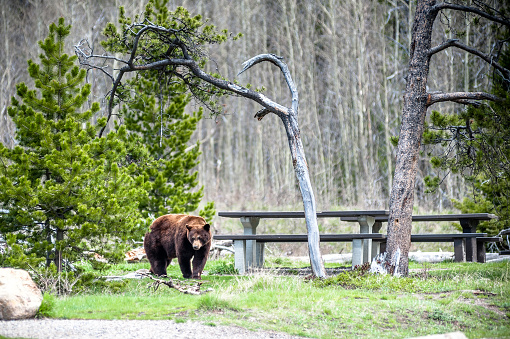Camping in the great outdoors is a beloved pastime for many people. This is because it offers the chance to disconnect from the hustle and bustle of everyday life and immerse oneself in the beauty of nature.
The experience of being surrounded by serene landscapes, sleeping under the stars, and waking up to the soothing sounds of the wilderness is unparalleled.
However, as you revel in the goodness of the world of nature, you must also recognize that you’re sharing the environment with a diverse array of wildlife. This may be a problem, depending on how you handle the situation. But don’t worry, we’re here to help.
This article is a guide that will teach you how you can harmoniously coexist with the animals that call the woods home.
Understanding Animal Behavior
Before embarking on a camping trip, it’s essential to have a basic understanding of the animals you may encounter. From majestic deer and curious raccoons to potentially dangerous predators like bears or coyotes, the animal kingdom is an integral part of the camping experience.
Each species has its unique behaviors and motivations for approaching campgrounds. Understanding these patterns is the first step in ensuring a safe and enjoyable camping adventure. Check out the motivations of common animals that you’re likely to encounter when camping below.
Deers visit campsites in search of easy-to-reach vegetation. Raccoons are notorious for their scavenging habits and may be attracted by the scent of food. Larger predators, like bears, may approach out of curiosity or the scent of an unsecured food source.
Preventative Measures
To mitigate the risk of wildlife intrusions at your campsite, the first line of defense is your choice of location. Campsite selection plays a pivotal role in determining the likelihood of animal encounters. We recommend opting for established campsites, which reduce the chances of surprise visits from curious animals.
Securing your food is another critical preventive measure. Bears, in particular, have a keen sense of smell and can detect food from miles away. Use bear-resistant food containers or designated food storage lockers provided at campgrounds to keep your provisions safe. For smaller critters like raccoons and rodents, you should ensure your food is stored in airtight containers and never leave it unattended.
By proactively carrying out these preventative measures, you can significantly reduce the risk of wildlife disturbances and ensure a safer camping experience for you and the animals that call these natural spaces home.
Campsite Hygiene and Cleanup
Maintaining a clean campsite is a matter of courtesy and a crucial step in minimizing wildlife interactions. Adhering to the “Leave No Trace” principle ensures your campsite remains free from enticing odors that might attract animals.
To achieve this feat, you should:
- After meals, thoroughly wash dishes away from your sleeping area, using biodegradable soap to minimize environmental impact.
- Dispose of trash in designated containers promptly.
- Consider using odor-blocking trash bags to deter curious wildlife further.
- Inspect your campsite before turning in for the night and ensure no food scraps or wrappers are left behind.
Useful Tools and Techniques
Equipping yourself with the right tools and techniques can provide an added layer of protection against wildlife encounters.
The first technique involves using bear-resistant canisters or bags for food storage. These specialized containers are designed to thwart even the most determined bears. Additionally, bear bells or noise-making devices can alert wildlife to your presence and allow them to steer clear.
Natural deterrents like citrus peels, coffee grounds, or vinegar-soaked rags can act as effective barriers against smaller critters. These scents are unappealing to animals and can help keep them at a distance.
Keep in mind that while these tools and techniques can be helpful, they are not foolproof and should always be used in conjunction with other preventative measures.
Respecting Wildlife and Regulations
Camping in natural habitats comes with a responsibility to respect and protect the resident wildlife.
To fulfill this responsibility, you should avoid approaching or feeding wild animals, as this can disrupt their natural behavior and lead to potentially dangerous situations. You should also observe them from afar so they’ll have the space they need to thrive.
Moreover, respecting and protecting resident wildlife is adhering to park and wildlife regulations. These guidelines are in place to safeguard both the ecosystem and the visitors who enjoy it. They often include specific instructions regarding food storage, campsite selection, and wildlife interactions.
Conclusion
As you pack up your camping gear and bid farewell to the wilderness, take a moment to reflect on the delicate balance between humans and wildlife. Embracing the beauty of nature also means respecting its inhabitants.
By implementing the strategies outlined in this guide, you’ve safeguarded your camping experience and contributed to conserving these precious environments.


